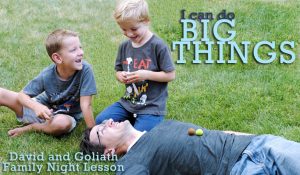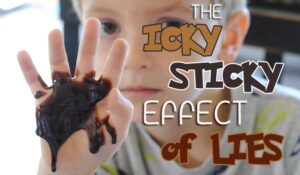This Family Night Lesson is about the Power of Words. How they can be used to uplift or damage. Teach your family to speak with kindness!
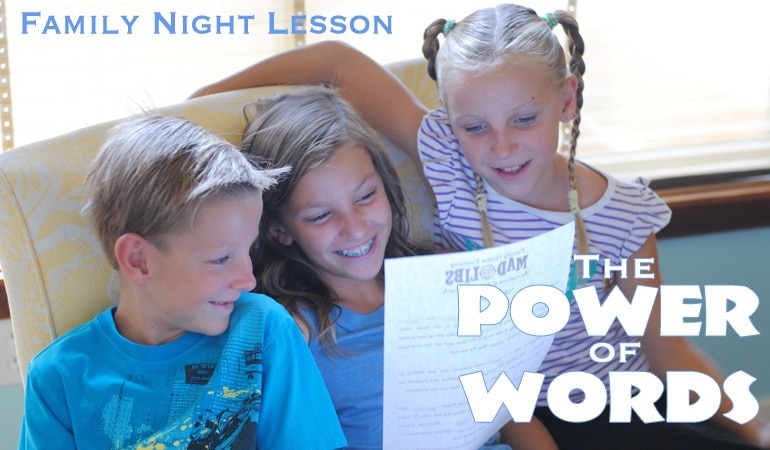
When you were a little kid, did you ever hear the expression, “Sticks and stones may break my bones, but words will never hurt me?” Funny how such a false motto could gain so much momentum in our society. Words can, in fact, be terribly hurtful. In turn, they can also be a building force for good.
Words are a pretty amazing thing. This Family Night Lesson is about the Power of Words. How they can be used to uplift or damage. Teach your family to speak with kindness and then participate in an extremely silly activity together as you use random words to complete free printable Family Night Mad Lib stories.
Lesson:
Start off the lesson by asking your family if they heard any words that day that made them feel good or happy? Repeat some of the phrases out loud. They might remember a compliment or some words of encouragement that were given. Maybe it was a simple happy, “Hello!” that was offered at school that made them feel noticed.
Some words that might have made them feel good were the words said in family prayer or if they read a comforting passage from the scriptures. Did they hear music that had positive lyrics that them feel good? Words surround us!
Then, ask if they heard any words that made them feel sad or upset? A harsh reprimand from a teacher or parent, a teasing kid at school, or a sarcastic sibling may have used words in a way that was harmful or hurtful.
Did words have power to change the course of their day?
I love this quote by Mohammed Qahtain a famous public speaker, “Words have power. Words are power. Words could be your power.”
How do words have power?
A popular article by Doctor Hyder Zahed provides insight to what power words have, “Words are singularly the most powerful force available to humanity. We can choose to use this force constructively with words of encouragement, or destructively using words of despair. Words have energy and power with the ability to help, to heal, to hinder, to hurt, to harm, to humiliate and to humble.”
Take a minute to test out how certain words said aloud make your family feel. Say these words and let them voice their reactions:
- Ugly
- Candy
- Slimy
- Fat
- Kitten
- Looser
- Princess
- Trash
- Fluffy
- Cuddle
- Stupid
Isn’t it interesting how words have an energy associated with them that makes you feel a certain way? Now that you know this, you can make words be your super special power. Choosing the right types of words and saying them in a loving respectful way can actually be a force for good just like a Super Hero!
Did you know that God created the world by saying words? Gods words were pretty powerful. Yours can be too. God has commanded us to use good words.
Read the Scripture: Ephesians 4:29 “Let no corrupt communication proceed out of your mouth, but that which is good to the use of edifying, that it may minister grace unto the hearers.”
What would be considered corrupt communication? How about: bullying text messages, gossip, lies about a friend, hurtful comments about a peer’s appearance, jokes about a classmate or family member, ungrateful expressions to a parent, and negative remarks about yourself.
Another major form of corrupt communication is using bad language. The Church of Jesus Christ of Latter-day Saints teachers that foul language (swearing) is both degrading and harmful to the spirit. We should not let others influence us to use foul language. Instead, we should use clean language that uplifts and edifies others, and we should choose friends who use good language. Setting an example will encourage those around us to use clean language. If friends and acquaintances use profanity, we can good-naturedly encourage them to choose other words. If they persist, we can politely walk away or change the subject.
If we take out all of the negative and corrupt language and replace it with “that which is edifying” what kind of things can we say and do? How about: giving a compliment to a friend, saying thank you to a teacher or parent, giving yourself a pep talk when you start to feel insecure, saying I love you to a sibling, writing a kind note, and bearing your testimony of the Gospel.
There is plenty of space for good communication in our lives. What kind of results can you expect to generate with the power of positive expression? People will want to be around you because you make them feel good. You will brighten the world with your positivity and kindness. You will perform better in your classes at school because you have told yourself that you can! Your parents will want to do more for you because they can hear and see your gratitude. You life will be full of love and abundance! Pretty cool stuff right?!
Elder Holland said, “Our words, like our deeds, should be filled with faith and hope and charity, the three great Christian imperatives so desperately needed in the world today. With such words, spoken under the influence of the Spirit, tears can be dried, hearts can be healed, lives can be elevated, hope can return, confidence can prevail.”
Encourage your family to focus on the words they speak throughout the week. Try to find ways to uplift each other with your language and tone. See if it invites the Spirit into your home more abundantly!
Activity:
This activity makes me giggle. I love doing Mad Lib stories. They are always so silly. My children love thinking of crazy words to use to fill in the missing story pieces. I hope you enjoy it too. The purpose of this lesson is to drive home the point that words are pretty powerful. Word choice is critical to making these stories believable or ridiculous. By changing a few words, the entire story can transform. Word are pretty powerful.
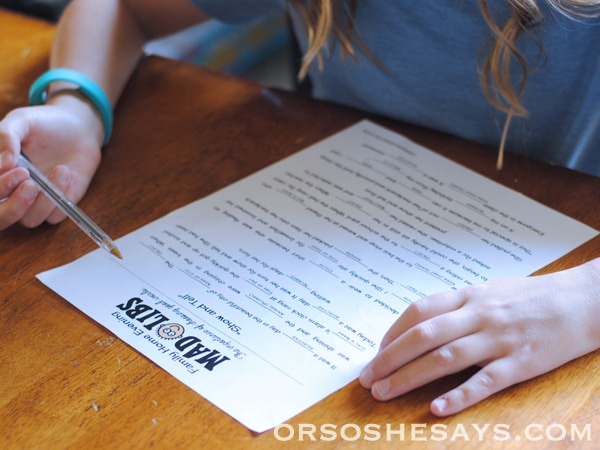
If you haven’t done Mad Lib stories before, here is a little explanation on how it works. Download or free template HERE and print the story onto paper. There are missing words shown on the page with a large underscore mark. Beneath the blank space is a category listed of what type of word belongs in that spot. For example, it may say Verb, Noun, Adverb, Number, etc.
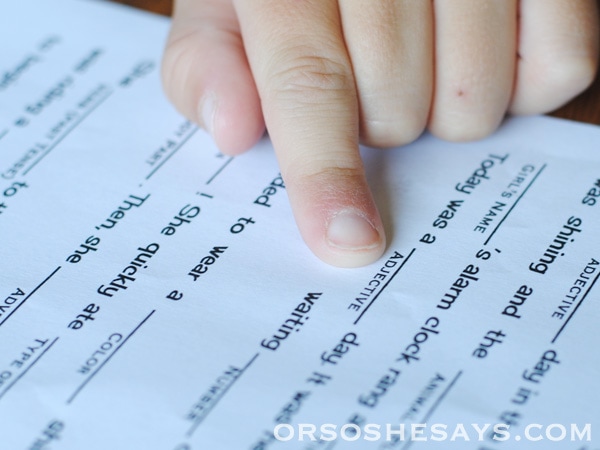
One person in the group, the scribe, will ask the others to supply words by giving them the word categories listed in the story. Do not give hints or let the group see the story. The group will submit word choices and the scribe uses them to fill in the blanks. Then, the scribe reads the story back to the group using all of the random and ridiculous words that were created by the group. Don’t be alarmed if it doesn’t make perfect sense! It is supposed to be silly.

Conclusion:
I hope you have fun together learning about the Power of Words. Take a moment to use your powerful words to remind your family how much you love them. Point out their strengths and thank them for participating. Bear your testimony about how clean, positive, and uplifting language can invite the Holy Ghost into your life and make a positive impact for good!
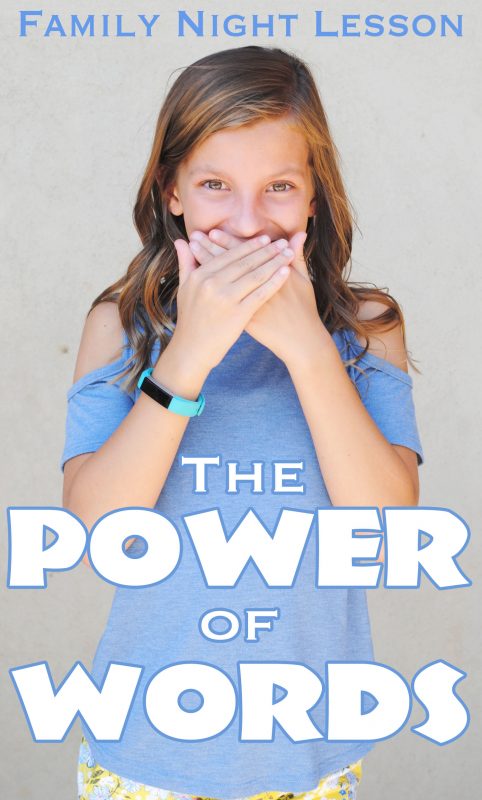
Get more Family Night posts here:
David and Goliath Family Night Lesson
Family Dinner Conversation Cube
The Icky Sticky Effect of Lies
